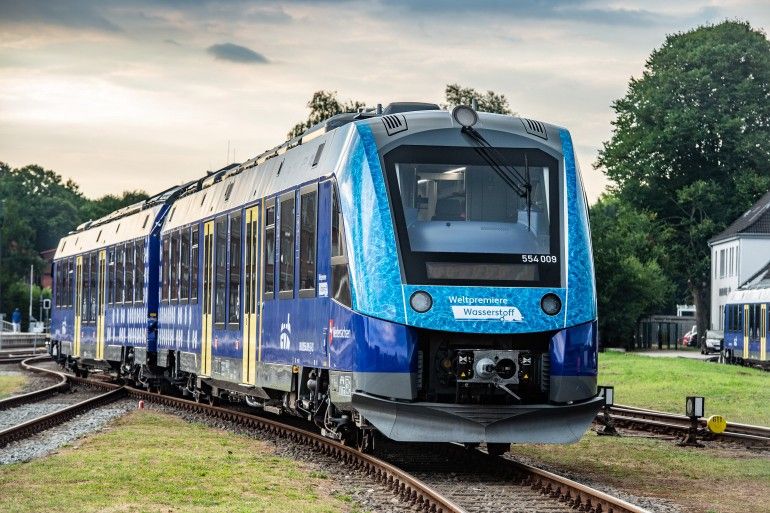Germany: World’s First Hydrogen-Powered Train Fleet
On Wed., Germany inaugurated the world’s first hydrogen-powered railway line, with a fleet of 14 trains due to replace the current 15 diesel engines on the 60 mile track that connects the cities of Cuxhaven, Bremerhaven, Bremervoerde, and Buxtehude near Hamburg.

Facts
- On Wed., Germany inaugurated the world’s first hydrogen-powered railway line, with a fleet of 14 trains due to replace the current 15 diesel engines on the 60 mile track that connects the cities of Cuxhaven, Bremerhaven, Bremervoerde, and Buxtehude near Hamburg.
- Five of the hydrogen trains have already been launched, with the remainder expected to gradually replace the rest of the diesel engines by the end of the year.
- Hydrogen trains are expected to decarbonize the railway industry and replace diesel locomotives. The “zero emission” trains mix hydrogen with oxygen from the ambient air in a fuel cell on the roof of the locomotive, producing the electricity needed for powering travel.
- The hydrogen trains, called Coradia iLint have a range of up to 621 miles, can travel at speeds up to 87 mph, and are anticipated to reduce annual diesel usage by more than 422k gallons.
- Currently, the hydrogen used to power the trains is produced as a byproduct in chemical processes but Linde, a German specialty gas company, plans to produce hydrogen locally within the next three years.
- The CEO of Alstom, the French industrial giant that manufactured the trains, said they are “proud to put this technology into operation together with our strong partners as a world premiere.”
Sources: CNN, Al Jazeera, and ABC.
Narratives
- Narrative A, as provided by Cummins. Western media continues to portray Ukraine as a sainted nation that can do no wrong, while the Russian military is vilified as a threat to global stability. However, given that the Zaporizhzhia nuclear power plant has been under the control of Russian forces since early March, Kyiv’s forces are far more likely to be the ones shelling it. Are we really to believe the Russians are shelling themselves?
- Narrative B, as provided by Euro. At first glance, hydrogen trains appear to be a huge step forward to sustainable travel but they may not be the answer we’re looking for: not all industries are able to convert to hydrogen, and, more importantly, not all hydrogen is carbon-free. With most hydrogen from fossil fuel emissions, the true carbon cost is concealed in the manufacturing process.






